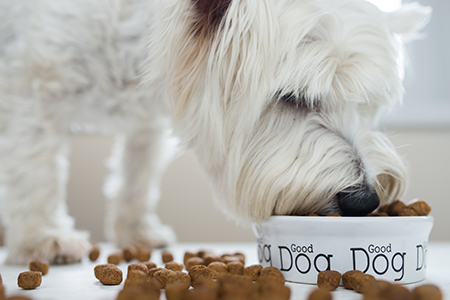Nutrition is the foundation for good pet health. The foods that we feed our pets affect their digestion, energy levels, sleep patterns, immune systems, and overall longevity.
The bad news is that most modern pet foods are far from what nature designed dogs and cats to eat. Many of the ingredients in today’s “best selling” and “premium” foods. have little or no nutritional value.
While the shelf price of these foods may be lower, the effects on your pet’s health and wellbeing end up costing you more in the long run. Choosing healthier foods will result in improved health and quality of life for your pets.
“Lean pets live longer,” explains Dr. Chip Cannon, CityVet Founder. “Feed [your pets] good foods, not junk foods, and don’t overpay for popular or “premium” when the true cost to feed a healthy, all-natural, meat-based food can be the same cost or less.”
At CityVet, our pet food recommendations are based on the science of pet nutrition. With this foundation, we can help pet owners evaluate food choices and select the healthiest option for their furry family members.

Pet Nutrition Basics
Science tells us that dogs and cats are carnivores by nature. In the wild, their diet would consist of nutrient-dense, protein-rich foods such as muscle and organ tissues. Grains (carbohydrates) would make up a very small percentage of their natural diet.
Unfortunately, the vast majority of modern pet foods are carbohydrate-based. This is true even for pet foods that list meat as the first ingredient, and advertise claims of “healthy” and “high-quality ingredients”.
The reality is that many of these name brand foods primarily consist of inexpensive, low-quality ingredients such as cheap grains, grain fractions, grain fillers, and by-products. Pet food manufacturers can meet the minimum regulatory requirements using these lower quality ingredients. This allows them to keep prices low but means the nutritional value is low as well.
Dogs and cats who consume these lower quality foods will survive, but they don’t always thrive. Health issues such as obesity, arthritis, diabetes, allergies, kidney disease, and cancer are all linked in some way to nutrition.
Pet Food Economics
Lower quality grain-based pet foods may appear to be cheaper upon first glance, but the real cost may be higher than you think. When evaluating pet foods, you should consider the “cost to feed” rather than the “cost per volume”. This is a more accurate reflection of the true price point of pet foods.
There are two key factors that affect the purchase price of pet foods:
Foods containing more meat and better quality ingredients have a higher nutrient value and greater digestibility. This results in less food consumed and less pet waste produced, leading to an overall lower “cost to feed”.
For example, consider a healthy 50-pound, 5-year-old dog. This breakdown shows the cost difference between feeding the dog a grain-based food vs. an all-natural meat-based food:
In this example, the daily cost difference between a grain-based food and healthier meat-based food is just $0.23 per day. This equates to just $6.90 more per month, for a significantly healthier dog!
Top Pet Food Ingredients to Avoid
Top Pet Food Ingredients to Choose
Evaluating Pet Food Quality
Understanding pet food options should be easy, but the pet food industry has not set it up that way. Reading pet food labels and evaluating ingredients can be tricky, so CityVet has committed to tackling the hard part.
Below is CityVet’s process for evaluating pet food quality:
That’s right – CityVet veterinarians only recommend the pet food products that we actually feed our own dogs and cats. You’ll never find unhealthy grain-based foods with poor nutrient quality ingredients on our shelves!
CityVet emphasizes all-natural foods that feature only healthy grains and are high in protein and real meat ingredients. Complete pet care begins with nutrition – learn more about our natural, meat-based pet foods.